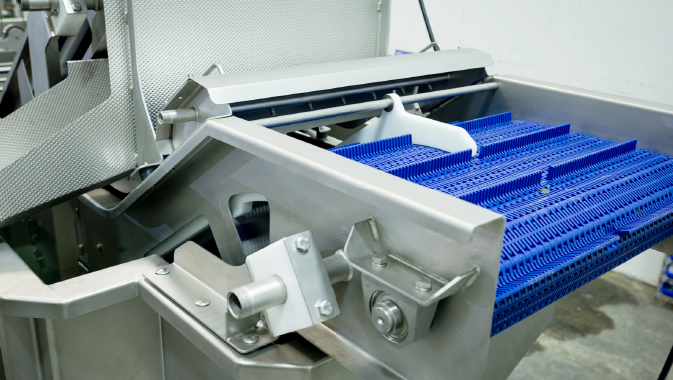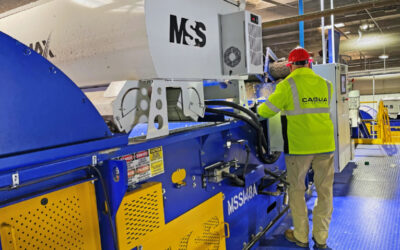Precision Industrial Equipment was founded in 2013. It operates in the beautiful Yakima Valley of Washington State and is locally owned. It designs, builds, and installs customized equipment, with after-sales services, to North American and European food processors.
~
“I like seeing things built from scratch,” says Patrick Flumerfelt, President of Precision Industrial Equipment (PIE). “Satisfaction for me means seeing something created from an idea and seeing it come to life on paper, then assembled in the shop and then watching it process and run. I like seeing things built from scratch and it’s also really interesting to me to see how I can get better at what I’m doing,” he says.
“This is what gives me the greatest sense of accomplishment, to see something go from nothing to something that works really well.”
As he does so, PIE is also making a vital contribution to the health and well-being of American and European consumers. The fruits and vegetables that are processed and flash-frozen in the equipment Flumerfelt’s company designs and manufactures “are a much fresher product,” he says, “because we create a lot of systems that wash, clean and convey these foods all within a very sanitary, controlled environment. This way means that we don’t need as much heating and chemical usage to keep the food safe. If a green bean is washed, processed and flash-frozen, it retains a good percentage of its natural vitamins.”
Fresher than fresh
In fact, research indicates that frozen vegetables actually retain more vitamins and nutrients than fresh ones which are transported some distance to market.
In the May 13th, 2017 newsletter, ABC Health Well-being, Melanie McGrice, spokesperson for the Dietitians Association of Australia, cites several studies indicating how nutrients in fresh veggies decrease when they have to travel to market and continue to decrease in home refrigerators after the weekly shopping.
“Water soluble vitamins, including Vitamin C and some Bs, are lost from fresh vegetables the longer they hang around,” Ms. McGrice writes, but she says they are retained when veggies are flash-frozen down to -18 Celsius, a process which also doesn’t affect the fiber content. Her conclusion: frozen vegetables are not only convenient; they can be a healthier choice than fresh ones.
Coming through
Flumerfelt’s background is not in nutritional science, but actually mechanical engineering. He holds an Associate of Science Engineering from Yakima Valley Community College and a degree in Mechanical Engineering and Business Management from Washington State University. In addition, he has almost twenty years’ experience in the food industry.
Beginning in 2000 he first worked in engineering design and project management at Marq Packaging. Next came engineering design and project management at Tree Top, a producer of sugar-free apple sauce, 100-percent pure fruit juices with no additives, and fruit snacks.
“I gained a lot of experience in food processing from running projects for Tree Top and working on juice and sauce applications,” he says. “So that is how I came to start my own business at the end of 2013.”
At the time, his wife Jenna, who is now the company Vice President, had been employed as Strategic Accounts Manager at United Rentals, a construction rental company. But back at Precision Industrial Equipment, with a growth rate of 10 to 15 percent annually and a staff of 80, “it became apparent by mid-2018 that it was too big a job for me to handle by myself,” Flumerfelt says. “So that is when Jenna came in to provide support and bolster the company.”
Putting the safety into food
Put simply, the end result of products produced by Precision Industrial Engineering is nutritious food for the consumer. But this doesn’t do justice to the intensity with which PIE focuses on the sanitary-enhancing aspects of the design and manufacture process. This is how the company supports the food processing industry’s drive for impeccable sanitary processes and all-important food safety, helping it grow its business.
As Flumerfelt explains, “PIE strives intensively to make sure that the equipment doesn’t have harborage points. What I learned in the companies I worked for is that they want equipment to be created that bacteria and microbes can’t build on and the more they can have that kind of equipment, the less likelihood there is that they’ll have to use strong chemicals or heat to keep the product safe. We’re working to make sure we – our clients and ourselves – would never be at the center of a food-product recall because of equipment that couldn’t be properly cleaned.”
According to Flumerfelt, having the cleanest equipment possible is the reason Milne Fruit Products chose PIE to customize a new facility with five different lines in Prosser, WA. There’s a root-vegetable line, one for other vegetables such as butternut squash, and three for berries, larger fruit such as pears, and for lettuce and leafy greens. (See: ‘Specializing in 100% Fruit and Vegetable Products,’ Business in Focus, Nov. 2018.) “They wanted it designed with minimal tubing, without any hollow cavities or hollow tubing that could harbor microbes or bacteria,” he told us.
Giving life to ideas
Moreover, with PIE’s advanced equipment and processes, any food processor dealing with the company, such as Milne, can see the entire project through state-of-the-art 3D drawings before it’s built (PIE uses Solid Works™ and AutoCAD™). Explains Flumerfelt, “We send a 3D PDF to the customer who can click on it, rotate the image, see every nut and bolt, and really be able to review everything before it’s made. As an example, Milne was a design-build project that we adjusted multiple times throughout the project to meet their needs.”
While excellent design is fundamental to the success of the equipment, so is its construction. At PIE this is done in-house, with great attention to detail, including surface preparation. PIE employs a unique wet glass-bead process to clean contaminants off the stainless steel and take rust off welding edges before the pieces are assembled.
“It’s been done in the past with a dry method using glass bead and blasting the material in the same way, but we’ve added water to our mix which provides a much smoother finish.” Flumerfelt says that not only does the wet glass-bead process clean contaminants, “it flattens out the material, making a food-safe finish for the customer, so there are no pits on the surface where bacteria can lodge and grow.”
Once the pieces are assembled, the entire piece of equipment is set up for a trial run at PIE’s facility before being taken apart for shipping and installation.
Flexible approach
In addition to designing entirely new plants for some customers, PIE works with existing food processing plants and supplies such services as electronic control systems that can meter a wash line – start, stop, slow down or speed up – all at the touch of a button from a control screen.
Complete new design-build project? A makeover? A tweak? Flumerfelt says PIE can do any of these. “We can go in and redesign part of a line or we can take an integral piece and redesign it to meet today’s standards,” he says. “It’s all custom-designed and we don’t use templates, nor do we build something over and over. These are one-off pieces. We work with the owners, with their space and their products and we custom-build each piece for the customer’s needs. There is always a better way to do something and I don’t think we’ve ever built the exact same piece of equipment twice. We always come up with better and cleaner ways to do it.”
Care for food, clients, and the public
Flumerfelt is thoughtful about his company’s role, both for the present and in the future. “What I like to focus on is being on the cutting edge of food-safe equipment, of having the most sanitary equipment we can come up with using the technology we currently have. It’s important to me to make sure we’re providing the best product,” he explains.
“From our company’s point of view, it’s to ensure its longevity; for our food processing clients it’s to guarantee their business success and, most importantly, it’s for the safety of the public. That is what I strive for.”













